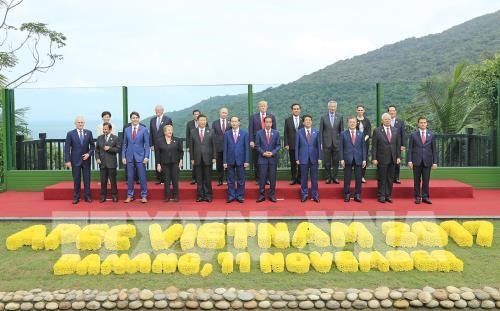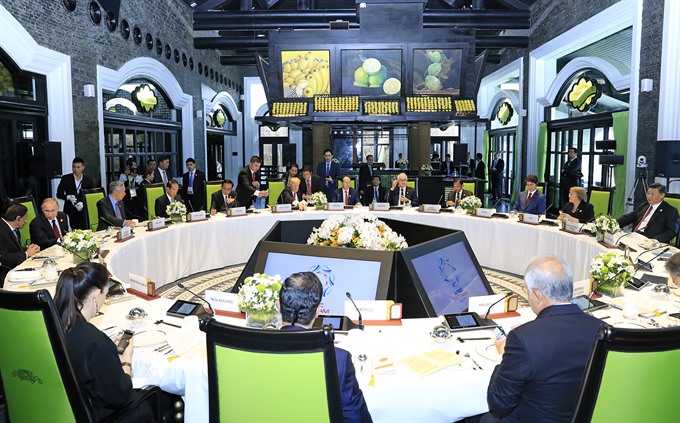www.aljazeerah.info
News, November 2017
Archives
Mission & Name
Conflict Terminology
Editorials
Gaza Holocaust
Gulf War
Isdood
Islam
News
News Photos
Opinion Editorials
US Foreign Policy (Dr. El-Najjar's Articles)
www.aljazeerah.info
|
Editorial Note: The following news reports are summaries from original sources. They may also include corrections of Arabic names and political terminology. Comments are in parentheses. |
Da Nang 2017 Declaration Stresses Multilateral Trade, Inclusive Growth Among APEC Member States
Vietnam News, November 11, 2017
 |
 |
| Leaders of 21 APEC economic economies pose for a group photo at the end of the 2017 APEC Economic Leader's Week, November 11, 2017 | The 25th APEC Economic Leaders' Meeting commences on Saturday morning in the central coastal Vietnamese city of Da Nang, November 11, 2017 |
Đŕ Nẵng Declaration stresses multilateral trade, inclusive growth
ĐÀ NẴNG –
The APEC 2017 Economic Leaders’ Meeting ended on Saturday with leaders of 21 member economies adopting the Đŕ Nẵng Declaration that reiterated their commitment to multilateral trade that fosters inclusive growth and reaffirmed their confidence in the forum’s ability to tackle future challenges together.
President Trần Đại Quang, who chaired the meeting, said the declaration, coming at the conclusion of the summit themed Creating New Dynamism, Fostering a Shared Future, reaffirmed leaders’ long-standing commitment to APEC’s mission of fostering sustainable economic growth and prosperity in the Asia-Pacific region.
The document was adopted with high consensus, President Quang told local and foreign media at a press briefing.
“This is the most important outcome of the summit as well as the APEC Year 2017,” he said.
Recognising the significant challenges the region’s economies face, the leaders pledged to work together and take the following actions: promote innovative, inclusive growth; sustainable employment; create new drivers for regional economic integration, strengthen the capacity and innovation of micro, small and medium enterprises; enhance food security and sustainable agriculture in response to climate change; and foster a shared future.
During the meeting’s two discussion sessions, the leaders agreed that in order to improve growth quality, competitiveness and productivity of member economies, it was imperative that APEC member countries reinforce the quality of education and equip regional workers with skills to better adapt to the employment environment and labour market, which are undergoing significant changes due to the fourth industrial revolution.
“We have adopted a framework for the development of human resources in the digital age,” the President said.
“Measures and policies in the framework will not only meet the general concerns of the region, but also provide an impetus for Việt Nam to continue effectively implementing strategic breakthroughs in human resource sdevelopment...”
He noted that with the aim of generating new dynamisms for sustainable and inclusive growth, the meeting spent a substantial amount of time discussing strategic measures to develop micro, small and medium enterprises in a green, sustainable and innovative manner; promote starts-up and supporting industries; develop sustainable agriculture in response to climate change; strengthen food, water, and energy security; enhance structural reform and capacity; mitigate natural disaster risks; increase women’s economic empowerment and promote sustainable tourism development.
The leaders agreed that promoting free and open trade and investment, and fostering regional linkages and connectivity is a mission that members will continue, contributing to maintaining APEC as a driver of global economic growth and connectivity, he said. “The meeting reaffirmed the commitment to completing the achievement of the Bogor Goals on liberalisation and facilitation of trade and investment, and enhancing economic and technical cooperation in efforts towards the formation of the Free Trade Area of the Asia-Pacific (FTAAP).” “The leaders emphasised the role of APEC in backing a law-based, free, open, fair, transparent and inclusive multilateral trade system” he said. The meeting applauded cross-border e-commerce that creates conditions for APEC to effectively tap the potential for developing the Internet/digital economy as well as global supply and value chains.
President Quang said APEC was doing its utmost to achieve Bogor Goals by 2020 and prepare for its fourth decade of development.
The decision also reflects the determination of member economies to build an Asia-Pacific community of peace, stability, dynamism, cohesion and prosperity, with people and businesses at its heart, he stressed. Việt Nam became a member of the APEC community in 1998, and has since hosted the APEC Year twice in 2006 and 2017.
“Việt Nam is an active and responsible member of the international community with an open economy which is deepening its international economic integration,” President Quang said. - VNS
APEC needs to bolster its leadership
November 11, 2017 -
ĐÀ NẴNG –
President Trần Đại Quang has called for APEC member economies to bolster their leadership to find new drivers for growth, trade, investment, connectivity and ensure that benefits from globalisation and economic integration are equally distributed.
“Only by doing so, can we contribute to a peaceful, stable, dynamic, interconnected and prosperous Asia-Pacific,” he told attendees at the 25th APEC Economic Leaders’ Meeting, which commenced on a sunny Saturday in the central coastal city of Đŕ Nẵng.
Leaders of the 21 economies of the Asia-Pacific Economic Co-operaiton (APEC) were also joined by Managing Director of the International Monetary Fund (IMF) Christine Lagarde at the opening session.
In his opening remarks, President Quang stressed that over the past 25 years, the world and the region have undergone profound changes in economic and international relations, and in the balance of power.
“However, with the strategic vision to promote economic co-operation as the foundation of APEC and a focus on removing barriers to trade and investment, APEC has shown its dynamism, adaptability and self-transformation to become the premier regional economic forum and a driver of global growth and integration,” the President said.
“It has also played a leading role in addressing urgent global challenges. The Bogor Goals of free and open trade and investment and support for the multilateral trade system, as well as growth and connectivity strategies and programmes, have provided a long-term orientation for APEC’s activities and created hundreds of concrete areas for co-operation, for issues including the next generation of trade and investment.”
“We have also responded to the new demands of the digital era” he said, noting that the fourth industrial revolution has created unprecedented opportunities for development and innovation.
The historic global agreements, especially the United Nations’ 2030 Agenda for Sustainable Development, have set the long-term direction for international co-operation on sustainable development.
Addressing the summit, Lagarde reported to APEC Economic Leaders on the prospects of the global and regional economy. She also shared policy implications that suggest new momentum for Asia-Pacific to continue to be a driver of growth and linkages in the coming years.
The summit takes place throughout the day with two sessions under the theme of "Innovative Growth, Inclusion and Sustainable Employment in the Digital Age" and "New Drivers for Regional trade, Investment and Connectivity".
During their working lunch, the leaders also discussed the topic of "Fostering a Shared Future".
A press conference of the 25th APEC Economic Leaders’ Meeting will be held in the International Media Centre in Đŕ Nẵng later in the afternoon under the chair of President Quang. — VNS
Source: http://vietnamnews.vn/economy/417366/apec-needs-to-bolster-its-leadership.html#FKzuA2jBguDYxu63.99
***
31st ASEAN Summit, related meetings to talk ASEAN Vision realisation
November 11, 2017
HÀ NỘI —
The 31st ASEAN Summit (ASEAN-31) and related meetings, which will be held in Manila, the Philippines, from Sunday to Tuesday, are set to focus on orientations and measures for enhancing connectivity to realise the ASEAN Community Vision 2025.
Prime Minister Nguyễn Xuân Phúc will lead a high-ranking delegation of Việt Nam to the ASEAN-31, the 20th ASEAN+3 Summit (with China, Japan and the Republic of Korea), the ASEAN+1 meetings (with China, Japan, the Republic of Korea, India, the US, Canada, the European Union, and the United Nations), and the 12th East Asia Summit.
These are the most important events of the year of ASEAN with the participation of leaders of the 10 ASEAN member nations and the bloc’s partners, which are major countries and important regional and international organisations.
On this occasion, PM Phúc will also take part in the 9th Mekong – Japan Summit and a meeting of leaders of countries joining the Regional Comprehensive Economic Partnership (RCEP).
At the ASEAN-31 and meetings between ASEAN and partners, participating leaders are scheduled to discuss orientations and measures for strengthening connectivity to realise the ASEAN Community Vision 2025, thereby sending a message about an ASEAN of peace, stability and self-reliance that is open to the world.
They will also look into ways to bolster ASEAN’s co-operation with partners while mulling over regional and international issues of mutual concern.
They are expected to sign one document, approve 25 documents and recognise 20 others. The host Philippines is set to issue nine declarations of the Chair of the meetings.
Amid complex developments in the region and the world, growing protectionism and emerging challenges, this time’s meetings will emphasise the intensification of ASEAN’s solidarity and central role. They also aim to help fuel economic growth, narrow development gap and improve the ASEAN Community’s capacity so as to have a self-reliant ASEAN benefiting people in the member countries and ensuring peace, security and stability in the region.
The building of the ASEAN Community continues to reap many positive outcomes as seen in the progress of implementing commitments in the ASEAN Community Vision 2025 and the accompanied blueprints, namely the ASEAN Political-Security Community Blueprint, the ASEAN Economic Community Blueprint, and the ASEAN Socio-Cultural Community Blueprint.
Notably, ASEAN specified the inter-sectoral and inter-pillar issues in which cooperation needed to be fostered, including human trafficking prevention and control, sea-related security and cooperation, counter-terrorism, cyber security, maintaining and building post-conflict peace, human rights, drug control, environmental crime, fighting money laundry and trans-national crime, nuclear security and safety, and border management.
The recent ASEAN Community building progress has given more priority to women; children; micro-, small- and medium-sized enterprises; promoting co-operation programmes on economic development and development gap narrowing; increasing connectivity; and ensuring social welfares.
The ASEAN Community Vision 2025 is also associated with the UN’s 2030 Agenda for Sustainable Development, which demonstrates the bloc’s efforts to become an active member of the international community.
Meanwhile, the grouping’s relations with its dialogue partners have been reinforced. ASEAN currently has dialogue relations with 11 partners, including seven strategic partners. Eighty-eight partners have also sent ambassadors to ASEAN.
While a number of countries and organisations want to establish relations with ASEAN, many non-ASEAN nations have expressed their interest in joining the Treaty of Amity and Co-operation in Southeast Asia.
These partners have also tightened multifaceted cooperation with ASEAN, assisted it to build a Community and supported the bloc’s central role.
The Vietnamese delegation’s participation in ASEAN-31 and related meetings is meant to help enhance ASEAN’s solidarity, bring into play the association’s central role, strengthen ASEAN’s ties with partners, and create a favourable environment for sustainable development in each country and the whole region.
The delegation also hopes to promote Việt Nam’s image as a country with active and responsible engagement in regional cooperation. — VNS
***
Share the link of this article with your facebook friendsFair Use Notice
This site contains copyrighted material the
use of which has not always been specifically authorized by the copyright
owner. We are making such material available in our efforts to advance
understanding of environmental, political, human rights, economic,
democracy, scientific, and social justice issues, etc. We believe this
constitutes a 'fair use' of any such copyrighted material as provided for
in section 107 of the US Copyright Law. In accordance with Title 17 U.S.C.
Section 107, the material on this site is
distributed without profit to those
who have expressed a prior interest in receiving the included information
for research and educational purposes. For more information go to: http://www.law.cornell.edu/uscode/17/107.shtml.
If you wish to use copyrighted material from this site for purposes of
your own that go beyond 'fair use', you must obtain permission from the
copyright owner.
|
|
|
|
||
|
||||||


